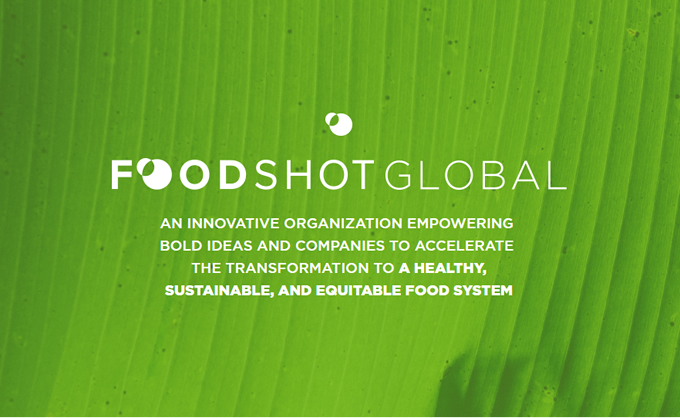FoodShot Global Announces Winners to First Moonshot Challenge

FoodShot Global, the world’s first collaborative capital investment platform that catalyzes innovation to transform the food system, today announced the winners of Innovating Soil 3.0. Trace Genomics received an investment from FoodShot Venture Partner, S2G Ventures. Additionally, the $535,000 GroundBreaker Prize was awarded to 3 individuals doing groundbreaking work in soil health to support a healthy, sustainable, and equitable food system.
Trace Genomics has developed the first analytics engine that learns as it maps the living soil. Founded in 2015 to serve the farming community, Trace Genomics helps growers maximize the value of every acre. The company is building the largest, most actionable body of soil intelligence, making thousands of growers experts on what’s underground. Working collaboratively across the agriculture ecosystem, Trace Genomics helps growers optimize costs, manage risk and protect their soil as a capital asset. Headquartered in Silicon Valley—and led by two female founders—Trace Genomics has raised $19 million in financing.
The first of two GroundBreaker Prize winners, Dr. Keith Paustian, was awarded $250,000 to accelerate the global adaptation of his COMET tool systems. This specialized technology provides farmers and land managers with sustainability metrics that can be used for decision support, as well as providing the information necessary to effectively implement policies that promote regenerative and conservation-based agricultural practices at scale. Dr. Gerlinde De Deyn was also awarded a $250,000 GroundBreaker Prize to advance her extraordinary work connecting plant biodiversity in space and time. Her research uses trait-based approaches to gain a mechanistic understanding of plant-soil interactions and their feedbacks to ecosystem functioning, including productivity, nutrient cycling, disease suppression, and soil carbon sequestration. Lastly, a $35,000 GroundBreaker "Seed" Prize was awarded to Dr. Dorn Cox to support his ambitious vision of using a collaborative Open Technology Ecosystem for Agricultural Management (OpenTEAM) to democratize access to environmental data and provide universal access to site specific global agricultural knowledge.
All three FoodShot winners will receive guidance, mentorship, and capacity-building resources for maximum impact and scale.
“I founded FoodShot Global envisioning a new way to harness the power of innovation, capital, and the collaborative spirit of the world’s leading stakeholders to effect change,” said FoodShot Global Founder and Chairman Victor Friedberg. “We chose to start with soil because any future that imagines 10 billion people eating healthy and sustainably with equal access will require healthy soil. The three people we announced today are all groundbreakers whose inspired work lays the foundation for the next generation of solutions to the urgency we now face as a civilization. I couldn’t be more impressed and inspired by these inaugural FoodShot Global award winners and look forward to sharing what they’re doing with a larger audience.”
The goal of Innovating Soil 3.0 is to identify the breakthrough scientific research, game-changing technologies, and innovative business models that can shift agriculture to a 21st century soil operating system that will support the planet. FoodShot Global winners are building a new soil foundation by providing technological or ecological tools that enable farmers to maximize yield and the long-term health of the land.
Since launching the Innovating Soil 3.0 challenge last September, FoodShot Global received 176 GroundBreaker Prize nominations and 235 applications for debt/equity investment from 6 continents and over 40 countries. These winners were judged by investors and experts based on core criteria including their alignment with FoodShot Global’s mission of creating a healthier, more sustainable, more equitable food system; their connection to the Innovating Soil 3.0 challenge, the global relevance of their work, their ability to realize growth and scale, and their likelihood of facilitating future innovation and systemic change.
About FoodShot Global Headquartered in New York, FoodShot Global is a non-profit investment platform founded by venture capitalist and co-founder of S2G Ventures, Victor Firedberg. FSG brings together a worldwide consortium of mission-aligned venture funds, banks, corporations, universities, and foundations to catalyze the success of global, transformative solutions to critical food and agriculture problems. FoodShot's annual Challenge identifies the most pressing obstacles to creating a healthy, sustainable, and equitable global food system. FoodShot Global Founding Partners include Rabobank, Generation Investment Management, Mars Edge, UC Davis Innovation Institute for Food and Health, The Rockefeller Foundation, The Builders Initiative, Armonia, and Stone Barns Center for Food and Agriculture, as well as resource partners The Foundation for Food and Agriculture Research, Sall Family Foundation, Path Foundation, The Nature Conservancy, and the Soil Health Institute, and venture partners S2G Ventures, Acre Venture Partners, Activant Capital, The Yield Lab, ASW Venture Partners and Grantham Foundation.
Comments (0)
This post does not have any comments. Be the first to leave a comment below.
Featured Product

